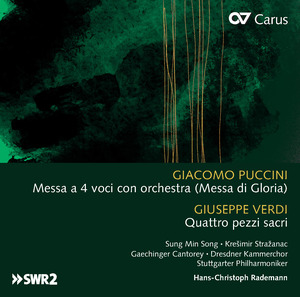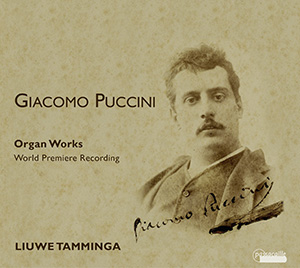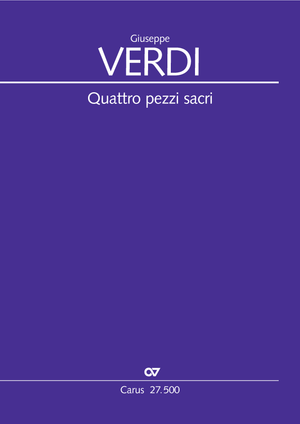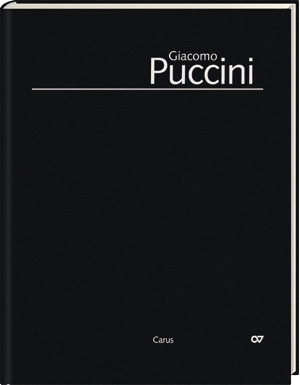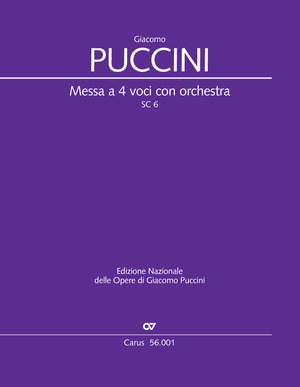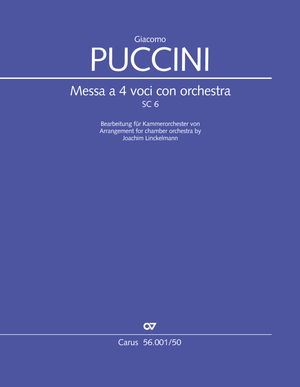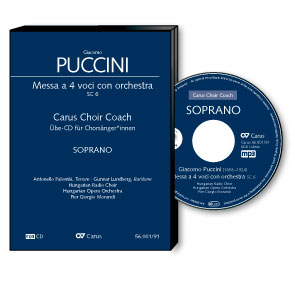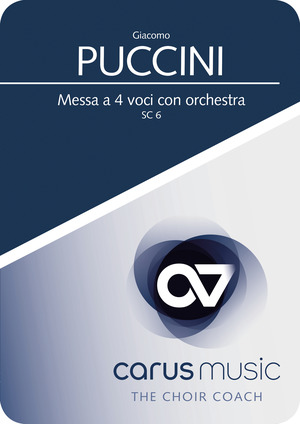Puccini: Messa a 4 voci con orchestra (Messa di Gloria) & Verdi: Quattro pezzi sacri
Puccini et Verdi, les deux maîtres de l’opéra italien, ont tous deux fait leurs premières expériences musicales dans le domaine de la musique sacrée. Puccini compose sa Messa a 4 voci en 1880 alors qu’il a 22 ans, à la fin de ses études. Verdi, son aîné de 45 ans, qui avait déjà remplacé l’organiste de son village d’origine alors qu’il était encore écolier, s’est encore une fois tourné vers la musique sacrée à la fin de sa vie. Il écrit les Quattro pezzi sacri dans les années 1890, à plus de 80 ans. La Messa du plus jeune – perdue jusqu’en 1952 – est gaie, enjouée et exaltante. Les Pezzi sacri de Verdi sont musicalement au niveau de ses opéras à succès – obsédants et sereins.
En raison de leurs effectifs différents (chœur a cappella, quatuor de solistes et double chœur avec grand orchestre), les quatre pièces sont rarement données dans un même cycle ; notre enregistrement propose maintenant cette opportunité. Le Gaechinger Cantorey, le Dresdner Kammerchor, les Stuttgarter Philharmoniker, Sung Min Song et Krešimir Stražanac sont placés sous la direction de Hans-Christoph Rademann.
Sommaire
-
Ensemble
Dresdner Kammerchor
Le Dresdner Kammerchor (Chœur de chambre de Dresde) – l’un des meilleurs chœurs d’Allemagne – est bien connu pour sa sonorité unique, faite d’une grande intensité et clarté. Rayonnement dynamique, homogénéité et transparence sonores souvent cités en exemple sont les points forts de cet ensemble demandé au niveau international. Le chœur a été créé en 1985 par Hans-Christoph Rademann et des étudiants du Conservatoire de musique « Carl Maria von Weber » de Dresde. De nombreuses tournées de concerts ont établi la notoriété de l’ensemble également hors d’Europe. En ont résulté des invitations régulières à d’importants festivals internationaux. Le répertoire du chœur va de la musique de la Renaissance à des compositions du 21ème siècle. Des interprétations de la musique chorale romantique et contemporaine ont été récompensées de prix spéciaux lors de concours internationaux, ainsi que du prix d’encouragement de la fondation Ernst von Siemens. En dehors de la pratique a cappella, le chœur de chambre se consacre intensément à la coopération avec le Dresdner Barockorchester et l’ensemble « Alte Musik Dresden », donnant des impulsions importantes à la pratique de la musique ancienne en Saxe. Une foule d’enregistrements pour la radio et pour le CD, ainsi que la coopération avec des orchestres allemands et étrangers viennent renforcer la renommée du Chœur de chambre de Dresde. Le CD paru aux Editions Carus de Stuttgart, avec le premier enregistrement mondial du Requiem en mi bémol majeur de Johann Adolf Hasse s’est vu décerner le prix de la Critique allemand du disque. Plus d'information sur la personne
-
Ensemble
Gaechinger Cantorey
The Gaechinger Cantorey is the ensemble of the International Bach Academy Stuttgart. It combines a Baroque orchestra and a hand-picked choir to form a finely tuned early music ensemble. Under the baton of academy director Hans-Christoph Rademann, this ensemble is dedicated to the international dissemination of a “Stuttgart Bach style.” Since its re-establishment as the Gaechinger Cantorey in 2016, the ensemble of the International Bach Academy has gained renown with numerous performances in Germany, such as at the Musikfest Stuttgart, the Bachwoche Ansbach, the Bachfest Leipzig, the Rheingau Music Festival, the Festspielhaus Baden-Baden, the Dresden Kulturpalast, and the Hamburg Elbphilharmonie, as well as abroad at the Théâtre des Champs-Élysées in Paris, in the USA (Fort Lauderdale, Chapel Hill, Norfolk, Princeton, Los Angeles, Irvine, Williamsburg), in Canada (Montréal), and in South America (São Paulo, Rio de Janeiro, Buenos Aires, Lima, Santiago de Chile, Bogotá). In addition, the Gaechinger Cantorey with its director Hans-Christoph Rademann pursues a busy recording schedule. On the Stuttgart label Carus and on accentus music, the ensemble has recorded the Christmas Oratorio, cantatas and the two Passions by J.S. Bach, Handel’s Messiah, Haydn’s Creation and other works. Digital podcasts and concert streams with the Gaechinger Cantorey are also available in the Bach Academy’s media library. From May 2023 to June 2024, the Gaechinger Cantorey, under the direction of Hans-Christoph Rademann, will perform all J.S. Bach’s cantatas from his first year as Kantor at St. Thomas’s Church in Leipzig – exactly 300 years after the historic event in 1723/1724. CD recordings of all the concerts in churches and concert halls in Stuttgart and the surrounding area will be released by Hänssler Classic. The Gaechinger Cantorey regularly and enthusiastically participates in the various music education formats of the International Bach Academy under the motto “BachBewegt!,” in which children and young people are actively invited to sing, dance and experience music on stage or as listeners in the concert hall. These include family concerts, joint performances and danced interpretations of important masterpieces of the oratorio literature. Plus d'information sur la personne
-
Chef d'orchestre
Hans-Christoph Rademann
| 1965Conductor Hans-Christoph Rademann is an immensely versatile artist with a broad repertoire who devotes himself with equal passion and expertise both to the performance and rediscovery of early music and to the first performances and cultivation of Contemporary Music. Born in Dresden and raised in the Erzgebirge mountains, he was influenced at an early age by the great Central German kantorial and musical tradition. He was a student at the traditional Kreuzgymnasium, a member of the famous Kreuzchor, and studied choral and orchestral conducting at the Carl Maria von Weber University of Music in Dresden. During his studies, he founded the Dresdner Kammerchor and formed it into a top international choir which is still under his direction today. Since 2013, Hans-Christoph Rademann has been the academy director of the International Bach Academy Stuttgart. He regularly collaborates with leading choirs and ensembles of the international music scene. From 1999 to 2004 he was chief conductor of the NDR Choir and from 2007 to 2015 chief conductor of the RIAS Chamber Choir. Guest conducting engagements have led and continue to lead him to the Nederlandse Bachvereniging, the Collegium Vocale Gent, the Akademie für Alte Musik, the Freiburger Barockorchester, the Deutsche Radiophilharmonie Saarbrücken Kaiserslautern, the Sinfonieorchester Basel, the Orchestre Philharmonique de Luxembourg, among others. Hans-Christoph Rademann has been awarded prizes and honors for his artistic work, including the Johann Walter Plaque of the Saxon Music Council (2014), the Saxon Constitutional Medal (2008), the Sponsorship Prize as well as the Art Prize of the state capital Dresden (1994 and 2014 respectively). He received the Preis der Deutschen Schallplattenkritik several times for his numerous CD recordings (most recently in 2016), as well as the Grand Prix du Disque (2002), the Diapason d’Or (2006 & 2011), the CHOC de l’année 2011 and the Best Baroque Vocal Award 2014. In 2016 he was awarded the European Church Music Prize of the city of Schwäbisch Gmünd. His exemplary interpretation and recording of the complete works of Heinrich Schütz with the Dresdner Kammerchor in the Stuttgart Carus-Verlag, which was completed in 2019, was awarded the newly endowed Heinrich Schütz Prize as well as the OPUS KLASSIK 2020 in the same year. Hans-Christoph Rademann is professor of choral conducting at the Carl Maria von Weber University of Music in Dresden. He is also artistic director of the Musikfest Erzgebirge, ambassador of the Erzgebirge and patron of the Christian Hospice Service Dresden. Plus d'information sur la personne
Questions fréquentes sur l'œuvre
 Il n'y a pas encore de questions et réponses concernant cette œuvre ou vous n'avez pas trouvé la réponse à votre question sur l'œuvre ? Cliquez ici et envoyez votre question spécifique à notre service clients.
Il n'y a pas encore de questions et réponses concernant cette œuvre ou vous n'avez pas trouvé la réponse à votre question sur l'œuvre ? Cliquez ici et envoyez votre question spécifique à notre service clients.


